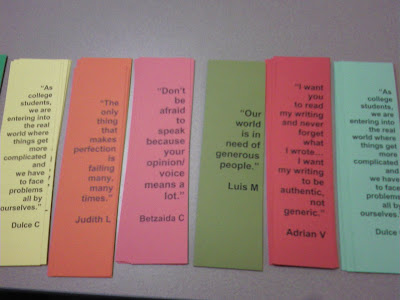This is the first week of Spring classes here at Pima, and most of the questions I've answered have related to schedules, class locations, online classes and other nuts+bolts kind of things that come up at the beginning of the semester.
One of the interesting facets of the beginning of a semester is that I see what school does to people. Not classes, not subject matter, not teachers, not a component of the educational system, but the system itself:
it freaks a lot of people out.
One guy was working on his first assignment for his Technical Writing class. He had to answer a few questions in the form of a memo. The first page in the chapter he was directed to showed an example of a memo and broke down its characteristics.
He asked me to help him clarify and then just kept talking about the class. Eventually, I asked him what he was hoping I could clarify. He pointed to the example of the memo and asked if he should write his like that. I said, "That or...?" He said, "I don't know." I pointed out that his teacher asked him to write a memo and gave him an example memo, so it makes sense that he should take what he's been given instead of assuming there are other possibilities he has no idea about.
For some reason, he assumed there were other unspoken options than the obvious one. Interesting.
Another guy was registering for MathXL, an online tool for math classes that I often see math students using on the Learning Center computers but know little about because I'm not the math guy around here. Larry the Math Guy was busy with another student, but he gave the student a registration sheet to follow and off he went, registering away.
At one point, he raised his hand and said, "Should I click the first one?" As I walked over to see what the first one was, I asked him if the first one was true. He read it out loud. It went like something like this: "I am using MathXL for a class and need to sign on to my teacher's class in MathXL."
Again, I asked if this was true. I looked over his shoulder and saw the second option was something about "studying on your own." He took a second and then said yes, the first one was true and clicked it.
For some reason, he needed confirmation to go ahead and choose something he already knew was true. Interesting.
I find this fascinating because of something
I heard in a TED Talk recently: "Education doesn't actually work by teaching you things. It actually works by giving you the impression that you've had a very good education, which gives you an insane sense of unwarranted self-confidence, which then makes you very, very successful in later life."
That's a quote from Rory Sutherland, an ad man, speaking about intangible value, not education, and I think he's right. It's a bold thing to say, and a potentially difficult sentiment for a teacher to hear, but I do think the value I received from my education was not the small items of material, the facts and figures, concepts and ideas that were passed along. It was the fact that I don't shy away from problems or assignments because I know I can figure them out if I give them a shot.
The problem for both of these students wasn't a lack of resources or support. They were each sitting at a public computer in a free tutoring center, holding all their class materials. The problem was a lack of confidence.
The answer in both cases was right there. Write a memo and use the example memo. Choose the option that is true, not the one that is false. The intangible value of education is problem solving, the ability to think, choose, adapt, revise, and to do so boldly. Hopefully, this semester gives those two the self-confidence to know that they can choose what they already see as the right answers.

